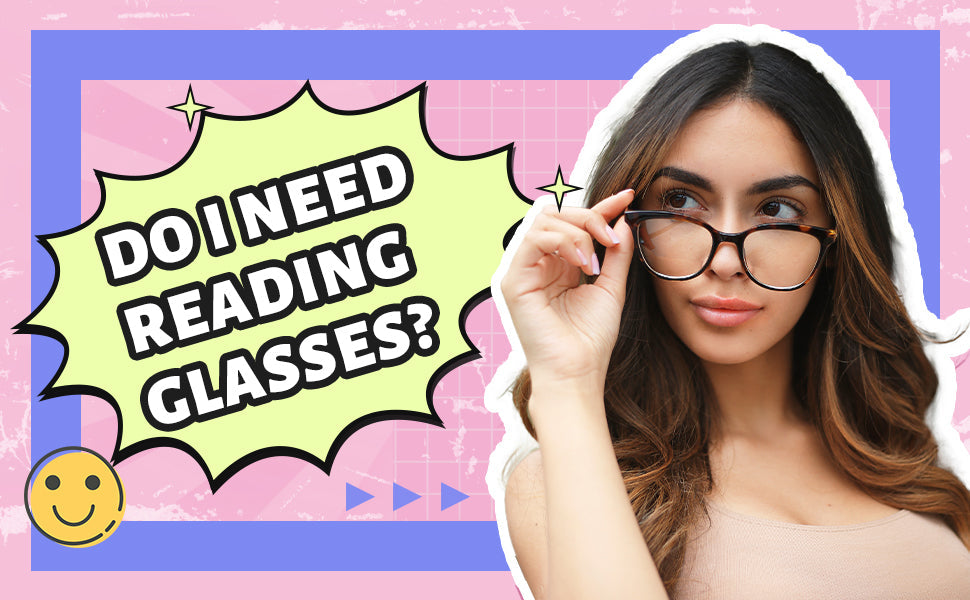
Must Know:Do I Need Reading Glasses?
Ask someone past their 40’s about their age and pat comes the answer, “Age is just a number”. Sure it is, and as you age, it is more about numbers, especially when it comes to your eyesight. Your vision power naturally tends to get weaker. You need to visit your eye doctor and get a prescription for reading glasses.
If you are a first-timer, you may wonder if you really need reading glasses. You try your best to avoid a checkup and continue to focus on the unfocussed until you realize the clutch of the eyeglasses has already reigned on you.
There’s no escape. The more you delay, the more trouble you invite.
But how can you tell whether you need reading glasses? The first sign is that your near-reading vision begins to decline. You have trouble recognizing texts at arm's length. Images would be somewhat hazy.
If that describes you, be prepared to schedule an appointment with your eye doctor soon. About 62% of the population in the US wears reading glasses because of an eye ailment is known as presbyopia.
This article includes identifying symptoms of weak vision and the immediate measures to bring clarity and enhance eyesight.
6 Reasons You Need Reading Glasses
1. It Could Be Presbyopia
Presbyopia literally translates to "old eye." This is not a dangerous eye ailment, but it develops when the lens inside the eye stiffens, making it harder to concentrate on close objects. This slow degradation of vision takes place gradually.
A fuzzy focus on close reading characterizes presbyopia. Although it is not a major vision-threatening condition, but rather a natural aging process that generally begins at the age of 40. There is currently no treatment to reverse or prevent presbyopia. If you have never taken an eye exam, you will most certainly need one in your forties due to the progression of presbyopia.

Even reading a book becomes challenging for persons who have presbyopia. They would hold their phone at arm's reach struggling to concentrate on a text message. If this sounds familiar, you may be suffering from the early stages of this eye ailment.
Reading glasses is the ideal solution for this. Using the proper reading lens power will prevent the typical arm's length reading problem.
2. Tired Eyes
If your eyes become weary quickly and you feel sleepy, your eyesight is worsening. Close-focus reading is defined as reading within 35cm of your eyes. You may have difficulty using your tablet or phone. What was once a simple chore may now have become more demanding in your eyes.
Because of presbyopia, close reading requires extra effort from your eyes. Your eyes have to work extra hard to focus on close-by things. Therefore, after an extended time of reading, your eyes may feel strained or tired.
Reading glasses can help a person see more clearly, allowing their eyes to focus and not have to work as hard. Depending on your ability to focus, you may require powerful reading glasses to see properly.
3. Night Vision Dilemma
If you have trouble seeing the dashboard in your vehicle, especially at night, you may be experiencing the early stages of presbyopia. Your night vision will gradually decline over time. It is difficult to see well in dimly light locations such as restaurants or cinema halls.
Even with all the lights turned on; this will make it difficult to see things well after dark. That is another sign of presbyopia.
Corrective reading glasses can make things easier. These will properly accentuate the menu at a dim-lit restaurant.
4. Glasses to Read on Computers
Eyes may get inflamed in the early stages of presbyopia as they struggle to overcome focusing difficulties. Reading glasses might help to reduce eyestrain and rubbing. If you notice yourself squinting frequently when attempting to focus, it is time to consult an eye doctor.

You may find that your reading or cell phone is not as distinct as it once was, or that using a computer causes you to become fatigued. Moreover, digital screens generate harmful blue light, often known as high-energy visible light (HEV).
If you often close-read from a digital screen, such as a Kindle tablet, we advise you to use reading glasses.
5. Headaches Splitting Your Head
Screen work at a distance greater than 35cm is considered an intermediate focus. If you struggle to focus for lengthy periods, it will probably result in a headache. We might attribute this to an outdated prescription in your glasses, causing your eyes to work much harder to focus properly.
Long durations of reading or computer work can trigger headaches because of eyestrain in those who have presbyopia. Reading glasses can aid to minimize eyestrain that induces headaches.
6. Hello Halos
Your ability to concentrate light into your retina might become dispersed as your eyes age. Fragmented light can cause circular halo patterns or glare. When staring at headlights or light bulbs, this blurred vision creates a halo effect. Spotting the unusual halo is caused by impaired focus. The presence of haloes and glare can suggest the onset of cataracts.
Reading glasses can help fix this problem, but they may indicate an underlying serious eye ailment. So, consult with an eye specialist near you.
The eye doctor can prescribe the proper reading glasses so that your eyes can calm and focus, allowing you to resume your normal daily activities.
Are Reading Glasses Necessary?
The obvious answer is yes. If you have any of the problems listed above, you should see an eye doctor for a thorough examination. Based on your assessment, they might advise a reading glass power or issue a prescription. It's also a good idea to have your eyes tested for any other problems.
If you also use glasses for distant vision, you might consider getting bifocals, trifocals, or progressive lenses. Bifocals allow you to see clearly both close quarters and far away. Trifocals and progressive lenses allow for near, medium, and far-sighted viewing.
The American Academy of Ophthalmology advises a baseline eye exam at the age of 40. Many visual abnormalities, including presbyopia, can begin at this age.
Thereafter, undergo the following exams:
At every 1 to 3 years, between ages 55 and 64
At every 1 to 2 years, starting at age 65
You may toy with the situation of whether to purchase cheap reading glasses to start with. The fact is cheap reading glasses are not necessarily harmful to your vision. Regardless of the price of the frame, an incorrect focal power will undoubtedly impair your ability to focus well and further deteriorate your vision.
As you age, your vision may significantly change. In a year or two, you might need to purchase a pair of reading glasses with more strength. If both your eyes are deteriorating differently, you may need prescription reading lenses on your glasses. In most cases, one eye will require more correction than the other.
Conclusion
A good pair of prescription reading glasses, whether single-vision reading glasses, computer glasses, or progressive lenses, can all aid in vision problems. The choice is ultimately determined by your specific lifestyle and visual needs. We provide glasses to assist you to improve your sight. They should always be prescribed, custom fit, and made just for you.






